Dog owners have been in a frenzy since June 17, 2019, when the FDA released a report pointing out a link between certain brands of grain-free food and heart problems in dogs.
What does the report say? What does this mean for your dog? We’ll discuss it all here.
FDA Grain-Free Dog Food Alert – Here’s the Situation:
In July 2018 the FDA announced that they were beginning to investigate reports of DCM (canine dilated cardiomyopathy) found in dogs eating certain kinds of dog food.
The findings from this investigation were published on June 17, 2019, detailing specific brands and ingredients the FDA found correlated with reports of DCM in dogs.
These new reports of DCM largely came from dogs on a grain-free dog food diet, which contained a high number of peas, lentils, and other legumes, and/or potatoes in various forms (whole, flour, protein, etc.).
The problematic dog foods features these as main ingredients (aka listed within the first 10 ingredients in the ingredient list, before vitamins and minerals).
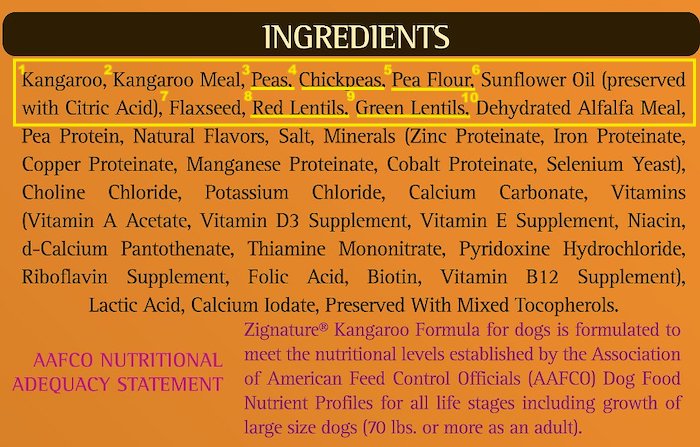
June 2020 Update: Conflicting Research
To complicate the DCM-Tuarine-BEG connection further, a new literature review, published in the June issue of Journal of Animal Science, calls into question some of the facts about the link between BEG diets and DCM.
The researchers did reveal some evidence demonstrating a link between BEG diets and DCM.
However, they also highlighted the fact that the dietary requirements of each individual dog vary slightly, so making blanket recommendations regarding nutritional requirements is problematic.
One dog may thrive on a BEG diet; another may develop DCM after eating the same food.
The researchers also point out a number of data-collection and analytical problems in some of the previous studies. This includes things like:
- Sampling bias, which essentially means that the initial researchers didn’t collect data from a representative and appropriate collection of animals.
- The collection of incomplete medical histories.
- The use of conflicting information.
- The inclusion of breeds that are already genetically prone to DCM.
- Incorporating opinions from veterinary nutrition influencers.
The entire paper is worth reading, but the researchers conclude that:
The use of the acronym “BEG” and its association with DCM are without merit because there is no definitive evidence in the literature.
Based on current literature, the incidence of DCM in the overall dog population is estimated to be between 0.5% and 1.3% in the United States. However, the FDA case numbers (560 dogs) are well below the estimated prevalence. Therefore, it is impossible to draw any definitive conclusions, in these cases, linking specific diets or specific ingredients to DCM.
They go on to call for more research, and end by saying:
While determining the cause of recently reported cases of cardiac disease is of the utmost importance, based on this review of the current literature, there is no definitive relationship these implicated diet characteristics and DCM.
We’ll do feel it necessary to point out that many of the scientists involved with this study are affiliated with BSM Partners – a consulting group for the pet industry.
This doesn’t necessarily imply bias, but it is important to note.
What Was In The FDA Food Alert Report?
While DCM has been a longstanding problem for certain larger breeds (most notably golden retriever, dobermans, Great Danes, and Irish wolfhounds), the 2018 investigation began when vets noticed that even dogs who were not predisposed to DCM issues began coming in with heart trouble.
While the exact reason as to why this correlation between grain-free diets and DCM exists is unknown and still under investigation, there is enough evidence to warrant concern.
How Many Cases of Dog DCM Have Been Reported?
For the purposes of the FDA’s report, the numbers include only cases where a vet or veterinarian cardiologist diagnosed DCM in a pet. While a few cases of DCM were reported in 2014, most were in 2018 after the FDA initially released notification of the potential grain-free/DCM connection.
While there has been a significant increase in the number of dogs diagnosed with DCM who were not pre-disposed, it’s still worth remembering here that this report shows 524 reports of DCM (515 dogs, 9 cats) between January 1, 2014 and April 30, 2019.
Considering that there are 77 million pet dogs in the US, this is a fairly small number. In fact, it’s .0000067% of the pet dog population. And while there certainly could be plenty of unreported DCM cases caused by diet, even if this number of reported DCM cases was 2x or 3x, it would still be a very small fraction of the pet dog population in the US.
The Peas and Lentils Correlation
The FDA report makes an effort to distinguish between various labels and categories for the suspected DCM dog foods.
Of the dog foods involved in DCM cases, 90% were classified as grain-free, while 93% had peas or lentils. A smaller subsection of the reported DCM dog foods contained potatoes and/or sweet potatoes.
In regards to protein sources for the DCM-reported dog foods, many contained a mix of proteins. However, chicken, lamb, salmon, and whitefish were common proteins.
Of course, this may be due to the fact that these foods are simply more popular and more common – not that the proteins themselves are causing any kind of issue.
As we’ve stressed several times throughout this article, the true cause of the DCM issues is unknown, although there are correlations.
Grain-Free Brands to Avoid (According to the FDA)
In the FDA’s June 2019 report, they noted that some brands of pet food were reported in cases of DCM more often than others.
Any brand named 10 or more times is included in the report. If your vet advises it, you may want to consider avoiding grain-free recipes from these brands.
- Acana
- Zignature
- Taste of the Wild
- 4Health
- Earthborn Holistic
- Blue Buffalo
- Nature’s Domain
- Fromm
- Merrick
- California Natural
- Natural Balance
- Orijen
- Nature’s Variety
- NutriSource
- Nutro
- Rachael Ray Nutrish
Looking for safe, grain-inclusive dog food? Check out our guide to NON grain-free dog food here!
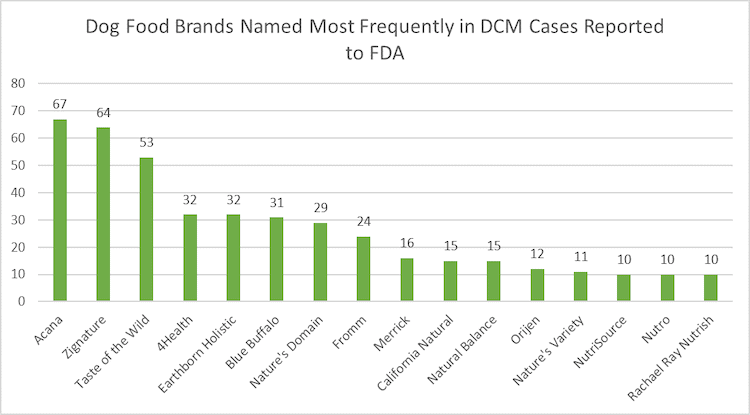
The Non Grain-Free Formulas Of These Brands Are Probably Fine
It should be noted that many of these are highly regarded, reputable brands. And owners should absolutely not be afraid to feed their dogs the grain-inclusive and pea-and-legume-free dog food recipes from these brands. It’s only the grain-free varieties to be potentially wary of.
It should also be noted that we shouldn’t be shaming these brands for these DCM incidents, with manufacturers simply following trends — with more owners seeking to feed their dogs a grain-free diet that mirrors their own desire for grain-free products, dog food manufacturers answered the demand.
Even the researchers discovering the correlation between grain-free diets and DCM do not know why there is an issue here. Is it the reliance on legumes and potatoes? It is something else? No one knows, and neither do these manufacturers.
There certainly isn’t kind of any sinister negligence going on.
Collectively, as dog owners and lovers, new information is being released that is changing the existing dog food landscape. We’re all learning this new information together, and what it means for our pets.
So, What is Causing the DCM in Dogs?
The veterinarian community believes the rise in DCM has something to do with grain-free dog food, but no one knows the specifics.
While the FDA has tested the levels of various minerals, metals, and amino acids of grain-free and non-grain-free dog food, no abnormalities appeared.
Both grain-inclusive and grain-free products were tested for:
- Protein, fat, moisture
- Crude fiber, total dietary fiber, soluble fiber, insoluble fiber
- Total starch, resistant starch
- Cystine, methionine, and taurine
The percentages for these were similar for both grain-free and non-grain-free dog food, but testing is continuing.
Is It Taurine Deficiency or Something Else?
Many owners have believed taurine deficiency to be at the root of the DCM issues in dogs, and sought out high taurine dog food and taurine supplements as a solution. However, it is important to understand that it isn’t completely clear what the appropriate taurine levels are for dogs (and it likely varies from one individual to the next).
Ideal taurine levels aside, it seems that many of the newer cases of dog DCM occur without any taurine deficiencies.
Instead, the problem seems to be something in the grain-free food or the way the food is processed — it’s hard to say.
Lisa M. Freeman, DVM, Ph.D., DACVN with Cummings Veterinary Medical Center at Tufts University, believes that DCM is not actually just a problem with grain-free foods, but with all BEG diets:
In total, these problematic diets include:
- B – “Boutique” dog food brands that come from smaller manufacturers
- E – “Exotic” ingredients found in the dog food (such as kangaroo or bison).
- G – “Grain-free” diets that rely on legumes, chickpeas, and others more unusual carbohydrate sources.
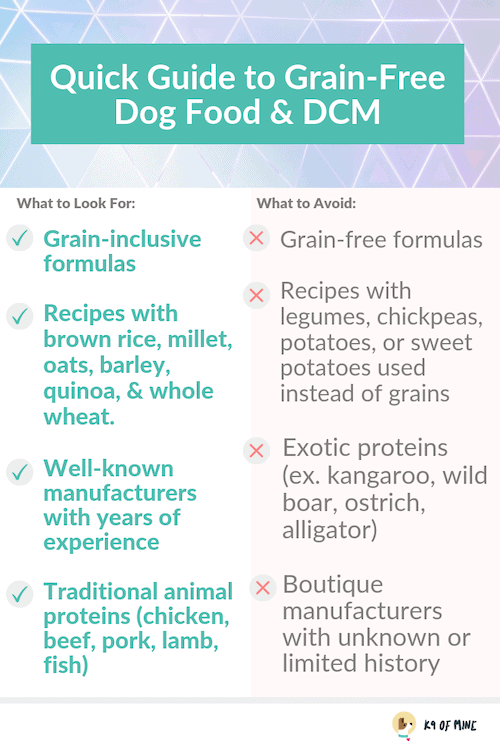
Don’t Freak Out, Your Dog Is Probably Fine — But Talk To Your Vet
The reports of dog DCM caused by diet are still quite small (515 over the past 5 years), so even if you do feed your dog grain-free, your risks are probably minimal.
Still, it’s definitely something worth discussing with your vet, and if you’re ready to change your dog’s diet, a switch to a non-grain-free dog food isn’t a bad idea (and always opt for whole-grains rather than refined grains if possible). You may want to avoid BEG foods completely.
Report Symptoms of DCM to Your Vet
Of course owners will want to be even more vigilant about signs of DCM and contact their vet immediately if they witness symptoms associated with DCM, including:
- Decreased energy
- Cough
- Difficulty breathing
- Episodes of collapse
This is all scary stuff, made more frightening by the fact that no one really knows what is causing these increased incidents of diet-related DCM in dogs. The best advice we can give is to simply work with your vet to find a safe and suitable diet for your pooch.
What do you feed your dog? Did you change your dog’s diet after the FDA’s report? Share what you think in the comments!



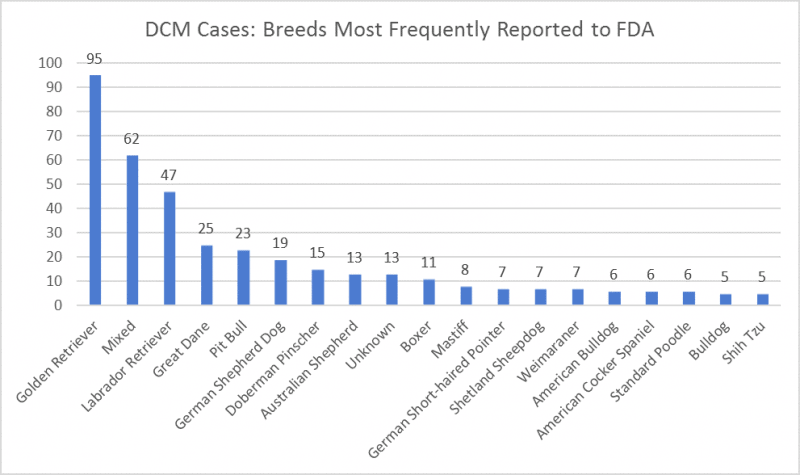
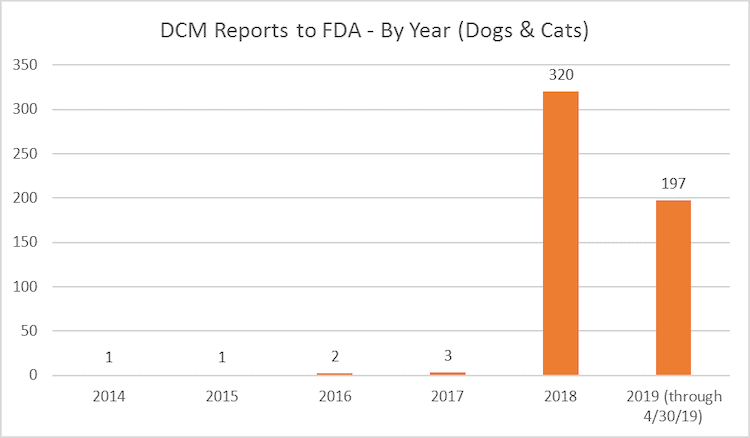
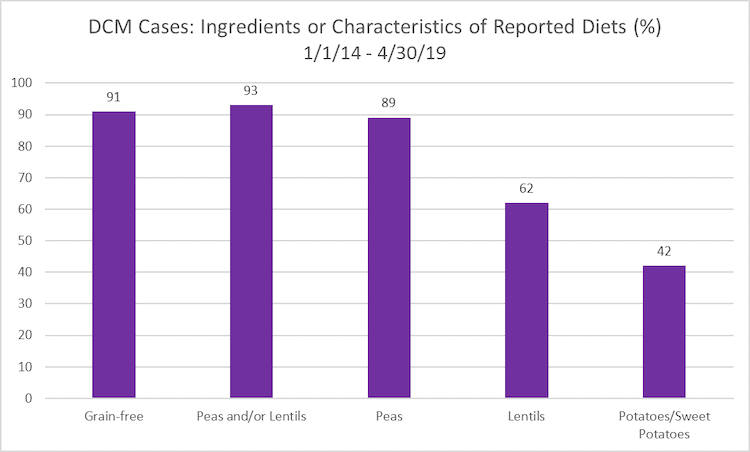







Leave a Comment